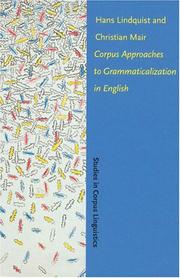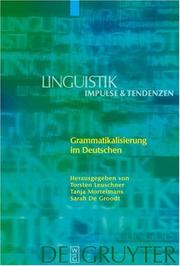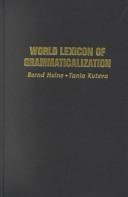| Listing 1 - 3 of 3 |
Sort by
|

ISBN: 9027222843 1588115232 9786612254437 128225443X 9027295484 1423766350 9789027222848 9781423766353 9789027295484 Year: 2004 Volume: 13 Publisher: Philadelphia : J. Benjamins,
Abstract | Keywords | Export | Availability | Bookmark
 Loading...
Loading...Choose an application
- Reference Manager
- EndNote
- RefWorks (Direct export to RefWorks)
As a counterexample to unidirectionality in grammaticalization, Newmeyer (1998:270) cites the loss of second-person singular subject clitics, e.g., in hastou and wiltou, in 16th century English (Kroch et al. 1982). These forms are a common, albeit optional, feature of Middle English. Though full thou forms replace -tou/-tow clitics in Early Modern English, second-person plural enclitics, subject proclitics, and object enclitics attest to the continued viability of clisis. This paper argues that -tou/-tow is a reduced form, not a clitic, its disappearance being attributable to loss of a phonological rule, not decliticization. This change predates the replacement of thou by you, the non-expression of subjects in imperatives, and the spread of do in questions and is sudden rather than gradual.
English language --- Grammar --- Pragmatics --- Discourse analysis --- Corpus linguistics. --- Corpuslinguïstiek. --- Engelse taal --- Discourse analysis. --- Grammaticalization. --- discoursanalyse. --- discourse analysis. --- grammaticalisatie. --- 802.0-56 --- 802.0-56 Engels: syntaxis; semantiek --- Engels: syntaxis; semantiek --- Grammaticalization --- English Language --- English --- Languages & Literatures --- Germanic languages --- English language - Discourse analysis --- Discoursanalyse. --- Grammaticalisatie.

ISSN: 16128702 ISBN: 3110183935 3110925362 9783110925364 9783110183931 Year: 2005 Volume: 9 Publisher: Berlin W. de Gruyter
Abstract | Keywords | Export | Availability | Bookmark
 Loading...
Loading...Choose an application
- Reference Manager
- EndNote
- RefWorks (Direct export to RefWorks)
Der vorliegende Sammelband ist das erste Werk seiner Art, das speziell der Grammatikalisierung im Deutschen gewidmet ist. In 15 Artikeln befassen sich die Autoren mit der Entstehung und dem historischen Wandel von grammatischen Elementen und Konstruktionen im nominalen Bereich, im verbalen Bereich sowie im Bereich zwischen Grammatik und Diskurs. Die Beiträge gehen vom theoretischen und methodologischen Diskussionsstand der internationalen Grammatikalisierungsforschung aus und suchen Antworten auf Fragen bezüglich der Systematik und Interaktion von Sprachwandelprozessen, ihrer funktionalen Motivationen und ihrer kognitiven Einbettung. Das Ergebnis ist ein Kompendium, das nicht nur für Germanisten von Interesse ist, sondern durch seine theoretische und empirische Reichweite auch Wissenschaftler anspricht, die sich für Grammatikalisierungsphänomene im Allgemeinen interessieren. Der Band enthält u. a. Beiträge von Elisabeth Leiss, Damaris Nübling, John Ole Askedal, Gabriele Diewald, Mechthild Habermann, Peter Auer und Susanne Günthner.
Grammar --- German language --- Grammaticalization --- Duitse taal --- Grammaticalization. --- grammatica --- grammaticalisatie --- 803.0-56 --- Duits: syntaxis; semantiek --- 803.0-56 Duits: syntaxis; semantiek --- grammatica. --- grammaticalisatie. --- Ashkenazic German language --- Hochdeutsch --- Judaeo-German language (German) --- Judendeutsch language --- Judeo-German language (German) --- Jüdisch-Deutsch language --- Jüdischdeutsch language --- Germanic languages --- German language - Grammaticalization

ISBN: 0521005973 052180339X 1107123313 0511176325 051104156X 051115710X 0511304382 0511613466 1280433272 0511048009 9780511041563 9780521803397 9780521005975 9780511613463 9781280433276 9781107123311 9780511176326 9780511304385 9780511048005 Year: 2002 Publisher: Cambridge Cambridge University Press
Abstract | Keywords | Export | Availability | Bookmark
 Loading...
Loading...Choose an application
- Reference Manager
- EndNote
- RefWorks (Direct export to RefWorks)
While the comparative method is concerned with regularities in phonological change, grammaticalization theory deals with regularities of grammatical change. In an A-Z format, this 2002 book summarizes the most salient generalizations that have been made on the unidirectional change of grammatical forms and constructions. The product of ten years of research, World Lexicon of Grammaticalization provides the reader with the tools to show how different grammatical meanings can be related to one another in a principled way, how to deal with issues such as polysemy and heterosemy, or why certain linguistic forms have simultaneous lexical and grammatical functions. It covers several hundred grammaticalization processes, in each case offering definitions of lexical concepts, suitable examples from a variety of languages, and references to the relevant research literature. Indices organized by source and target concepts allow for flexible use, and the findings delineated in the book are relevant to students of language across theoretical boundaries.
Grammar, Comparative and general --- Grammatica en taalverandering --- Grammatica. --- Grammaticalisatie. --- Vergelijkende en algemene grammatica --- Grammaticalization --- woordenboeken. --- English language --- Grammar --- 800 <03> --- 801.56 --- 801.56 Syntaxis. Semantiek --- Syntaxis. Semantiek --- 800 <03> Taalwetenschap. Taalkunde. Linguistiek--Naslagwerken. Referentiewerken --- Taalwetenschap. Taalkunde. Linguistiek--Naslagwerken. Referentiewerken --- Comparative grammar --- Grammar, Philosophical --- Grammar, Universal --- Language and languages --- Philosophical grammar --- Linguistics --- Philology --- Grammar, Comparative --- Arts and Humanities --- Language & Linguistics --- GRAMMAR, COMPARATIVE AND GENERAL --- LEXICOLOGY --- GRAMMATICALIZATION
| Listing 1 - 3 of 3 |
Sort by
|

 Search
Search Feedback
Feedback About UniCat
About UniCat  Help
Help News
News